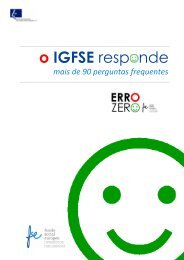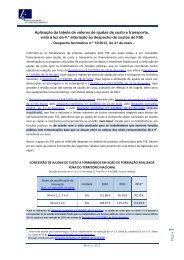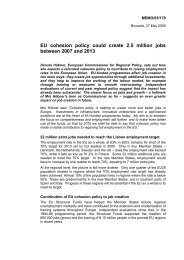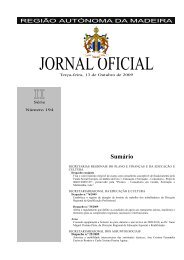Industrial Relations in Europe 2012 - European Commission - Europa
Industrial Relations in Europe 2012 - European Commission - Europa
Industrial Relations in Europe 2012 - European Commission - Europa
Create successful ePaper yourself
Turn your PDF publications into a flip-book with our unique Google optimized e-Paper software.
Generat<strong>in</strong>g new jobs and transform<strong>in</strong>g exist<strong>in</strong>g jobs <strong>in</strong>to “green” and “greener” ones will<br />
require new skills and a change <strong>in</strong> attitudes. A key issue is the role that social partners could<br />
play <strong>in</strong> this respect, on their own <strong>in</strong>itiative or at the <strong>in</strong>vitation of the public authorities. Social<br />
partners’ <strong>in</strong>volvement <strong>in</strong> this agenda has been gradually <strong>in</strong>creas<strong>in</strong>g, but the <strong>Europe</strong>an picture<br />
is far from homogenous, with a broad spectrum of practice <strong>in</strong> terms of levels of engagement<br />
and mobilisation. Little is known about the potential impact of the process of green<strong>in</strong>g on job<br />
quality, but a positive impact should not be taken for granted. Social actors believe that<br />
green<strong>in</strong>g will first and foremost have the greatest impact on the skills and tra<strong>in</strong><strong>in</strong>g dimension<br />
of job quality, while career and employment security, work<strong>in</strong>g and non-work<strong>in</strong>g time, health<br />
and safety and the social <strong>in</strong>frastructure will be less affected.<br />
Examples of social dialogue around these issues are predom<strong>in</strong>antly found <strong>in</strong> sectors <strong>in</strong> which<br />
the social partners are already well represented. Little or no dialogue is found <strong>in</strong> newlyemerg<strong>in</strong>g<br />
<strong>in</strong>dustries. In the electricity sector, and electricity generation from renewable energy<br />
sources, it is determ<strong>in</strong>ed by the degree to which the energy source is ‘established’. Only <strong>in</strong><br />
cases where electricity generation from renewable energy sources had already been carried<br />
out for a relatively long period of time with<strong>in</strong> a country (for example hydro-electric energy<br />
generation) or where established energy providers <strong>in</strong>creas<strong>in</strong>gly source from renewables, is the<br />
subsector well-represented by the traditional actors <strong>in</strong> established companies. In the newlyemerg<strong>in</strong>g<br />
<strong>in</strong>dustries (such as energy generation from biomass, w<strong>in</strong>d and photovoltaic<br />
sources), companies are very heterogeneous. Many are very small entities <strong>in</strong> remote areas and<br />
are therefore outside the reach and <strong>in</strong>terest of the social partners. On the employers’ side<br />
many bus<strong>in</strong>ess associations have formed with the <strong>in</strong>tention of represent<strong>in</strong>g companies <strong>in</strong> the<br />
sector, but these associations have not yet developed <strong>in</strong>to fully fledged social partner<br />
organisations with the right to barga<strong>in</strong>. On the trade union side, there are examples of active<br />
recruitment strategies <strong>in</strong> the newly emerg<strong>in</strong>g sectors <strong>in</strong> only a few countries, such as<br />
Germany, Portugal and the UK. In other countries, such as Malta and Cyprus, the renewable<br />
energy sector is still <strong>in</strong> its <strong>in</strong>fancy and no attempts to create representation can be detected.<br />
While <strong>Europe</strong>’s commitment to the move to a low-carbon economy is clear, recent austerityled<br />
reductions <strong>in</strong> public subsidies, tax <strong>in</strong>centives, feed-<strong>in</strong> tariffs and other public support<br />
measures might slow down the process of green<strong>in</strong>g. Data from the <strong>Europe</strong>an Restructur<strong>in</strong>g<br />
Monitor (ERM) show that as any young <strong>in</strong>dustry, green sectors are fac<strong>in</strong>g significant levels of<br />
turbulence. This mostly concerns companies <strong>in</strong> the solar and w<strong>in</strong>d power generation <strong>in</strong>dustry,<br />
which have come under some pressure due to overcapacity and <strong>in</strong>creased competition from<br />
Ch<strong>in</strong>a, compounded by the fact that some Member States have changed their support schemes<br />
for these <strong>in</strong>dustries. Yet at the same time, job growth <strong>in</strong> the green economy has been positive<br />
throughout the recession and is forecasted to rema<strong>in</strong> quite strong. Cases of knowledge<strong>in</strong>tensive<br />
job creation with<strong>in</strong> the renewable energy and energy efficiency sectors have been<br />
registered.<br />
Re<strong>in</strong>forc<strong>in</strong>g and promot<strong>in</strong>g social partners’ activities at all levels (<strong>Europe</strong>an, national,<br />
sectoral, regional and company level) is crucial for the successful transition towards a low<br />
carbon economy. There are <strong>in</strong>terest<strong>in</strong>g social partner <strong>in</strong>itiatives at different levels, <strong>in</strong> order to<br />
highlight what can be done. However, there rema<strong>in</strong> major challenges. Provid<strong>in</strong>g vocational<br />
16

















